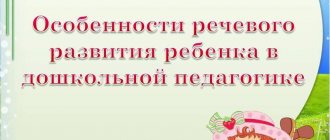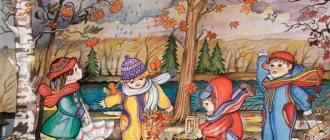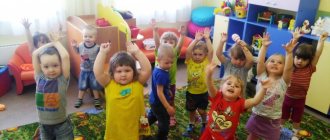Consultations for educators
The section provides consultations for kindergarten teachers on various topics, author's recommendations and consultations for kindergarten teachers. By attending kindergarten, a child should gain a lot of knowledge, important skills and abilities should be formed, and he should receive harmonious development.
It is known that one of the characteristics of preschool children is that a child can solve these problems, learn, develop, only if he experiences positive emotions from being in kindergarten, i.e. psychological comfort. Very warm, affectionate communication between the teacher and the children during the reception (hug, caress, say something very pleasant).
In the section of the site, consultations for kindergarten teachers for different groups contain many interesting publications for teachers on teaching children on various topics:
- Cultivating tolerance in preschool children. Tips for a teacher
- Test for a young teacher
- Testoplasty as a means of enriching vocabulary in children of senior preschool age
- Child development at an early age
- The role of the teacher in the child’s adaptation to kindergarten
- Consultation for educators “Children need fairy tales”
- Development of fine motor skills in children in kindergarten with general speech underdevelopment
- Consultation for preschool teachers “Designing a pedagogical project”
- How to work on a project?
- Fine motor skills in preschool children
- Art therapy techniques that help relieve nervous tension and connect the internal reserves of the child’s body
- Methodology for conducting educational activities in the educational field “Social and communicative development”
- Implementation of a system-activity approach in the cognitive development of children of primary preschool age
- Developmental principles in working with preschoolers
- Work of a teacher with parents on the prevention of child abuse
- Interaction between an additional education teacher and a teacher in the process of teaching the native language
- Rules of conduct and communication for teachers in preschool educational institutions
- Work plan for a teacher during the inter-certification period for five years
- Consultation for kindergarten teachers “Nurturing a child’s personality through work”
- Consultation for preschool teachers “A new look at parent meetings”
- Development of elementary logical thinking in children of senior preschool age
- Consultation for educators “Organizing and conducting experiments with preschoolers. Contents of experimental activity corners"
- Consultation for a teacher: first aid for poisoning with poisonous mushrooms
- The role and task of a kindergarten teacher
- Main directions for developing social relationship skills in preschool children
- Memo for teachers of the Federal State Educational Standard
- Gender education of preschool children
- Problems of continuity between kindergarten and school. Ways to solve them
- Consultation for kindergarten teachers “From fine art activities to creativity”
- Consultation for educators “Teaching solving problems using ingenuity (puzzles)”
Section for kindergarten teachers. The pages of the section contain materials necessary in the daily work of teachers of preschool educational institutions.
A kindergarten teacher looks after children while their parents are at work, but the list of functions of this specialist does not end there: he conducts educational classes, teaches the basics of reading, mathematics, teaches modeling, appliqué, drawing, music and dance, and also does physical education. The teacher-educator gives the child the first ideas about the world around him, the principles of relationships between people, helps him adapt and socialize, teaches him to distinguish good from bad, and explains the rules of behavior in society.
The consultation section for educators is intended for managers, deputy heads, senior educators, educators, kindergarten specialists, parents and those simply interested in raising children.
Consultations for teachers
REPORT to the teachers' council
30.08.2017
Human talent is a small sprout that barely emerges from the ground and requires enormous attention. It is necessary to groom and cherish, look after it, do everything necessary so that it grows and bears abundant fruit. V. A. Sukhomlinsky
Extracurricular activities of students are organized in order to form a unified educational space of the lyceum to improve the quality of education and implement the process of personality development in a variety of developmental environments. Extracurricular activities are an equal, complementary component of basic education and are intended for pedagogically appropriate employment of students in their free (extracurricular) time.
Objectives of extracurricular activities
Extracurricular activities are aimed at solving the following tasks:
- creating conditions for the most complete satisfaction of the needs and interests of students, strengthening their health;
- personal and moral development and professional self-determination of students;
- ensuring social protection, support, rehabilitation and adaptation of students to life in society
- formation of a common culture;
- education of citizenship, respect for human rights and freedoms, love for the Motherland, nature, family.
Thus, by organizing extracurricular activities, we support the child, develop his abilities and prepare the ground for these abilities to be realized. In a word, we create conditions for the development of every child, including gifted children.
There is an opinion that almost all children are gifted to varying degrees at birth. If we summarize all the definitions of giftedness, we can conclude that a gifted child is a child who stands out for obvious, outstanding achievements (or has internal prerequisites for such achievements) in one or another type of activity. But throughout their lives, in order to develop their talent, they have all sorts of conditions. These conditions can be created not only in the family, but also in preschool institutions, schools and other areas of activity that ensure the development of children.
Thus, extracurricular activities and additional education of students are an effective form of work to develop giftedness. All gifted children have a clearly expressed search need. They experience bright, intense emotions when doing certain work. They are also distinguished by extraordinary determination, the ability to concentrate for a long time, the ability to manage their activities (in a certain area). Giftedness can manifest itself: 1. As obvious (manifested) talent, which is in plain sight. Experts say that the number of such clearly gifted children is approximately 1-3% of the total number of children; 2. How age-related giftedness, i.e. at one age a child shows obvious talent, and then, after several years, this talent disappears somewhere; 3. As hidden (unmanifested) talent, i.e. giftedness, which for some reason did not manifest itself in the educational or other activities of the child. There are approximately 20-25% of such children.
It is obvious that the child’s family in all cases plays a big role in the development of the child’s personality and his talent. No matter how much we consider the role of natural factors or the influence of school on the development of a student’s personality and talent, in all cases the importance and role of the family is decisive. In turn, the school is faced with the task of optimizing the educational space, considering its own capabilities, and perhaps considering what resources of other organizations can be used in the implementation of extracurricular activity programs for gifted children.
One of the options for supporting the development of gifted children in the lyceum is the implementation of extracurricular activity programs, which constitute the basic educational program (BEP) of primary, secondary, and general education in accordance with the Federal State Educational Standard.
Extracurricular activities at the lyceum are implemented:
– subject teachers in the space of interaction with class activities in the form of electives, elective courses, etc.;
– class teachers, in the space of interaction with extracurricular activities in the form of project activities, exhibitions, competitions, holidays, museums and other lyceum events;
– administration, teacher-organizer, class teacher, in the space of interaction with extracurricular activities in the form of social events, festivals, concerts, shows and other public events;
– subject teachers in the form of extracurricular activity programs. Each of the teachers who carry out extracurricular activities is faced with the task of creating conditions under which any child could advance along the path to their own perfection and be able to think independently, outside the box.
However, today the Federal State Educational Standard imposes new requirements for educational results in general and for educational institutions in particular. School today is understood as an effectively organized comprehensive educational environment that ensures continuity of education. It is at school that not only the intellectual, but also the civil, spiritual and cultural life of the student is concentrated. The school must educate citizens and patriots, reveal the abilities and talents of students, and prepare them for life in a high-tech competitive world. In this regard, it is necessary to build new models of extracurricular activities and find their new forms, based on the principles of taking into account the needs of students and their parents, continuity, diversity of areas of extracurricular activities, diversity of forms of organization of extracurricular activities.
Such forms of extracurricular activities in the lyceum can be such as, for example, “Seasonal school” - organization of extracurricular activities during the holidays, “Correspondence school” - organization of extracurricular activities remotely, “Winter camp” - organization of extracurricular activities during the winter holidays within the framework of the school camps, “Counselor Training School” - organization of extracurricular activities to develop the patronage movement, “Research Laboratory” and others.
An important aspect here is the moment of stimulation and motivation of students. It is advisable to systematize the results of children's creativity in different manifestations. For example, awarding diplomas and valuable gifts at lyceum-wide assemblies, organizing a “Pride of the Lyceum” stand or in other nominations, “automatic” in the exam for high school students in a subject chosen by the student or a specialized subject, increasing vacation time; publication in the lyceum newspaper, on the lyceum website, etc.
Abstracts:
Human talent is a small sprout that barely emerges from the ground and requires enormous attention. It is necessary to groom and cherish, look after it, do everything necessary so that it grows and bears abundant fruit. V. A. Sukhomlinsky
Extracurricular activities of students are organized in order to form a unified educational space of the lyceum to improve the quality of education and implement the process of personality development in a variety of developmental environments.
Extracurricular activities are an equal, complementary component of basic education and are intended for pedagogically appropriate employment of students in their free (extracurricular) time.
Extracurricular activities are aimed at solving the following tasks:
- creating conditions for the most complete satisfaction of the needs and interests of students, strengthening their health;
- personal and moral development and professional self-determination of students;
- ensuring social protection, support, rehabilitation and adaptation of students to life in society
- formation of a common culture;
- education of citizenship, respect for human rights and freedoms, love for the Motherland, nature, family.
a gifted child is a child who stands out for obvious, outstanding achievements (or has internal prerequisites for such achievements) in one or another type of activity.
Extracurricular activities and additional education of students are an effective form of work to develop giftedness.
Giftedness can manifest itself: 1. As obvious (manifested) giftedness, which is visible to everyone. Experts say that the number of such clearly gifted children is approximately 1-3% of the total number of children; 2. How age-related giftedness, i.e. at one age a child shows obvious talent, and then, after several years, this talent disappears somewhere; 3. As hidden (unmanifested) talent, i.e. giftedness, which for some reason did not manifest itself in the educational or other activities of the child. There are approximately 20-25% of such children.
The child’s family in all cases plays a big role in the development of the child’s personality and talent
The school is faced with the task of optimizing the educational space,
Each of the teachers who carry out extracurricular activities is faced with the task of creating conditions under which any child could advance along the path to their own perfection and be able to think independently, outside the box.
School today is understood as an effectively organized comprehensive educational environment that ensures continuity of education.
It is advisable to systematize the results of children's creativity in different manifestations.




